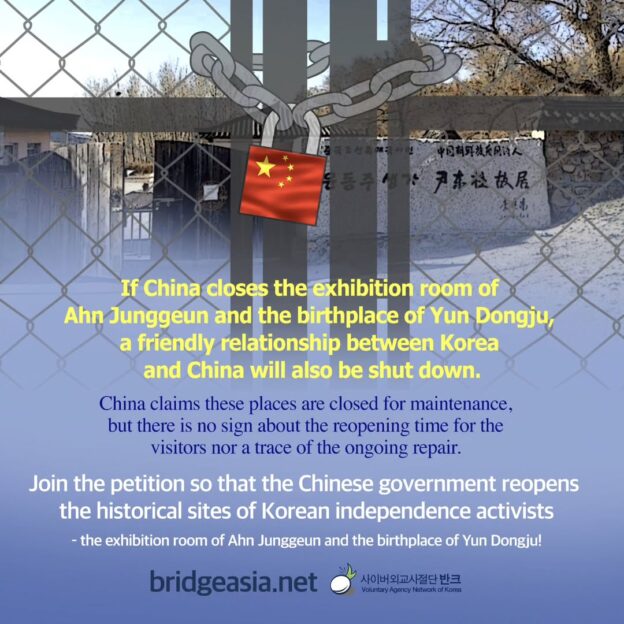
VANK is launching a campaign to demand the reopening of historical sites related to Korean independence activists in China. The campaign aims to raise awareness among the Korean government, citizens, and the global community about the significance of these sites and to urge their immediate reopening.
In August 2023, it was reported through Korean media that two prominent sites in China— the Ahn Jung-geun Exhibition Hall at the Dalian Lushun Prison Museum and the Yoon Dong-ju Birthplace in Yanbian—had been temporarily closed for renovation. Both sites are of great historical importance and are visited frequently by Koreans.
The Ahn Jung-geun Exhibition Hall, located at the Dalian Lushun Prison Museum, is dedicated to the legacy of Ahn Jung-geun, a heroic figure in the Korean independence movement. The exhibition features artifacts including a bust of Ahn Jung-geun, his solitary confinement cell, and writings from the prison. It also showcases the stories of other Korean independence activists, such as Shin Chae-ho and Lee Hoi-young, who were incarcerated at the same prison and later passed away.
The Yoon Dong-ju Birthplace in Yanbian is the home where the renowned poet Yoon Dong-ju lived until the age of 15. The site houses the preserved room where Yoon lived, along with original manuscripts, copies of his poetry books, and an exhibition dedicated to his work. This site, too, is an important cultural landmark for Koreans.
Despite the reported closures for renovations, neither site provided prior notice to visitors about the closure or the expected reopening timeline until it was covered in the Korean press. Further investigation revealed no signs of actual repairs being carried out at the sites, leading to suspicions about the validity of the renovation claims.
Following increasing criticism from the Korean public, Chinese authorities responded through the Ministry of Foreign Affairs, stating that the closures were temporary due to internal repairs. However, their responses did not provide clear details on the progress of the renovations or the reopening schedule.
Given the lack of transparency surrounding the closures and renovations, as well as concerns over China’s broader efforts to claim Korean independence figures as part of “ethnic Korean” culture through its so-called “Northeast Project” and “Cultural Project,” there remain many unanswered questions for the Korean public regarding China’s actions.
In response, VANK is producing posters in both Korean and English to rally global attention to the cause. The posters feature the message, “If China closes these sites, the friendship between Korea and China will also close,” alongside a call for people to join a petition urging the Chinese government to reopen the Ahn Jung-geun Exhibition Hall and Yoon Dong-ju Birthplace.
Additionally, VANK has launched policy petitions and global petitions calling for proactive engagement from the Korean government and relevant departments regarding the reopening of these sites and the protection of other historical sites in China related to Korean independence activists. VANK also emphasizes the need for effective action to address the issues related to the Northeast Project and Cultural Project by China.
VANK hopes that through this campaign, the Ahn Jung-geun Exhibition Hall and Yoon Dong-ju Birthplace will be safely reopened, and that historical sites related to Korean independence activists in China will be properly managed and protected. VANK urges the Korean government, citizens, and the global community to join in the efforts to preserve the legacy of these national heroes by supporting the petition and sharing the campaign.
Petitions:
https://www.woollimkorea.net/beginning-of-woollim/view.jsp?sno=396
https://www.bridgeasia.net/bridging-issues/view.jsp?sno=557